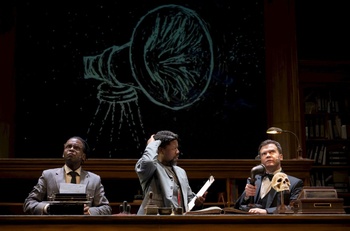The leading South African artist, film-maker, and theatre director William Kentridge has been a welcome guest at the Kunstenfestivaldesarts since its early years. He now returns with the theatre classic he created thirty years ago with the Handspring Puppet Company.
Nearly thirty years ago, shortly after the end of apartheid in South Africa, Faustus in Africa! was presented at the Kunstenfestivaldesarts. We know the saga of Faust, who sells his soul to the devil, from Marlowe and Goethe, but in William Kentridge's legendary production, it is transposed to Africa. In his deal with Mephisto, Faust gains unlimited access to the riches of the African continent – an approach that remains relevant today. The puppetry of the Handspring Puppet Company, the animation featuring Kentridge's charcoal drawings, the music of Warrick Sony and the late James Phillips, and the words of poet Lesego Rampolokeng turn this safari of selfishness and rampant capitalism into a rich and compelling spectacle.
Faustus then
Three decades after that first performance, William Kentridge is restaging Faustus in Africa! in the city where he partly found inspiration for the piece. From his studio in Johannesburg, he tells us the story once more. “The connection of Faustus to colonial history had two points of origin. One was the negotiated settlement between the old apartheid government and the new government coming in in South Africa in the mid-1990s, which always seemed to me like a pact with the devil: peace in South Africa came at the expense of justice and of people being held accountable for their acts in the past. That was a compromise that everybody, including myself, was remarkably pleased about and grateful for, but it came at a price, which we can see in the political and social difficulties South Africa faces today, thirty years later.”
"I kind of wished the museum of Tervuren had stayed as it was. As an object lesson in a particular kind of historical thinking"
Theatre director, film-maker and artist
“The second and more specific source of inspiration for Faustus in Africa! came from my visit to the AfricaMuseum in Tervuren, at the time I was in Brussels doing the production of Wozzeck in 1992. Even though I wasn't an expert on the Congo, colonial history was one of the subjects I had studied at university. I knew the Belgian colonial history had been a very bloody and terrible affair, but it remained largely unquestioned or was even kind of absent from the museum. It was that absence, as well as specific images from the museum, that I took back and which became part of the production. I know that the museum has since been reconstituted and rethought through, but I haven't been back to it, I must confess, since that visit in 1992. I kind of wished the museum had stayed as it was. As an object lesson in a particular kind of historical thinking.”
Faustus now
So that was then. What has happened to Faustus thirty years down the track? Kentridge: “Well, the point is that the production has not changed. We have shortened the script by a few minutes, and the actors are obviously younger actors. But we haven't changed the animation, the music or the puppets. What has happened is that the world itself has shifted. Things that were peripheral earlier now take centre stage, and vice versa. Questions of what to do with old monuments, of repatriation of stolen sculptures and artefacts, selling states for money, the connection between politics and money, have become so much clearer that I think one sees the same production in a very different way, as if it was a different production.”

©
fiona macphersonj
We will also get to see a selection of Kentridge's films at the festival. What makes him decide to make a film on a particular subject? “There is always a theme that interests me and a material in which to think. Whether they are theatre projects, charcoal animations, collages, puppets, masks…exploring the material becomes a language of thinking to discover the idea. And sometimes the drawings turn into animated films, and then we discover at the end what they're all about. Film is always about transformation, about provisionality. Clear, immediate answers are very often not the best ones. They're a relief, a reassurance, but they're not necessarily the best evocation of a question.”
Smoking compulsory
So finally, coming back to Brussels, what are Kentridge's early memories of the Kunstenfestivaldesarts, and in particular of its former director and founder Frie Leysen, who passed away five years ago? “My first memory is very clear. We performed Wozzeck in Théâtre 140 and met Frie Leysen in the foyer. We had come from a festival in Toronto, which had very strict no-smoking policies, but we noticed that the carpet of Théâtre 140 was pockmarked with cigarette burns. And so with some timidity, our company manager asked Frie if it was permitted to smoke in the theatre. 'It is not permitted, it is compulsory,' she answered. As a matter of fact, you needed a gas mask to enter the offices. (Laughs) Everybody there, I think, was only employed if they were chain smokers. The amount of red wine, cigarettes, and coffee was spectacular for us provincials coming from Johannesburg. But in the centre of this was wonderful Frie with her inventiveness, her desire for new work to be seen, her dedication to the artists performing at the festival. And for many years, it became a kind of second home to the Handspring Puppet Company and to myself. I have very deep and warm memories of Frie and still feel her absence.”
William Kentridge and his Handspring Puppet Company perform Faustus in Africa! on 29, 30 & 31/5 at the KVS, kvs.be
Read more about: Brussel , Podium , Events & Festivals , Kunstenfestivaldesarts , KFDA , KVS



